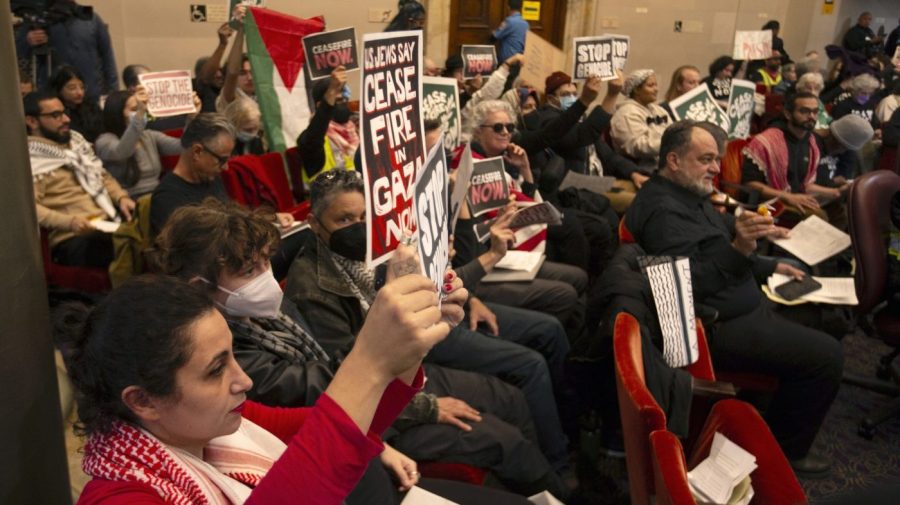Business
Palestinian groups accuse Meta of unfairly moderating speech amid Israel-Hamas conflict on December 1, 2023 at 11:00 am Business News | The Hill

Several Palestinian advocacy groups are calling on the parent company of Facebook, Instagram and WhatsApp to address longstanding content moderation issues that they allege have unfairly restricted Palestinian speech in the wake of the outbreak of the Israel-Hamas war last month.
The “Meta: Let Palestine Speak” petition accuses the tech giant of unfairly removing content and suspending or “shadow banning” accounts from Palestinians, while failing to adequately address “incendiary Hebrew-language content.”
The complaints about Meta’s content moderation policies stretch back several years, said Nadim Nashif, the executive director and co-founder of the Palestinian digital rights group 7amleh-The Arab Center for the Advancement of Social Media. 7amleh is leading the Meta petition alongside the digital rights advocacy group Fight for the Future.
Following an earlier outbreak of violence in May 2021 that prompted similar accusations of unfair treatment of Palestinians on Meta’s platforms, the tech giant commissioned an independent due diligence report.
The report found that Meta’s actions during the period of unrest “appear to have had an adverse human rights impact on the rights of Palestinian users to freedom of expression, freedom of assembly, political participation, and non-discrimination.”
Meta agreed to implement many of the recommendations from the report, including developing and deploying “classifiers” for Hebrew “hostile speech.” The classifiers, which use machine learning to detect violating content, had previously existed for Arabic but not Hebrew.
However, following the Oct. 7 attack on Israel by the Palestinian militant group Hamas and Israel’s subsequent airstrikes and ground invasion of Gaza, Nashif said Meta’s new Hebrew classifiers appear to have fallen short.
Meta acknowledged the shortcomings of its Hebrew classifiers internally last month, noting that the classifiers were not being used on Instagram comments because the machine learning-based tool did not have enough data to function properly, the Wall Street Journal reported.
The tech giant also lowered the threshold for an automated system that hides comments that could potentially violate the company’s policies on hostile speech from 80 percent certainty to 25 percent within the Palestinian territories, according to the Journal.
Meta, which lowered the thresholds for several countries throughout the region to lesser extents, reportedly sought to address a surge in hateful content after the Oct. 7 attack.
However, Nashif argued that lowering the threshold produces a “very aggressive content moderation approach,” which results in “lots of false positives” and content “being taken down that should not be taken down.”
Jillian York, the Director for International Freedom of Expression at the Electronic Freedom Foundation (EFF), similarly suggested that the current conflict has resulted in levels of content about Palestine and content removals that are “unprecedented” in scale.
In the wake of the present backlash, she argued that social media companies need to be “more transparent in everything that they’re doing, every step of the way” when it comes to moderating content.
“Basically, tell us what you’re taking down and tell us why you’re taking it down, who asked you to take it down and why,” York said.
She also emphasized the importance of making content moderation “culturally specific,” noting that Arabic is a complex language with multiple dialects across many different countries.
“Meta has not done its due diligence in ensuring that its moderation is culturally specific,” York said. “So the people who are moderating content for Palestine might be from Morocco, for example. They might not have the same dialect, they might not have the same understanding, they might not have the same words.”
“And that’s just the human moderators,” she continued. “Then you have the machine learning, automation and so on.”
Several recent problems with how artificial intelligence (AI) powered tools on Meta platforms have represented Palestinians have also highlighted the way in which human biases can affect such technology, Nashif noted.
Meta had to apologize last month after Instagram’s auto-translation inserted the word “terrorist” into the bios of some Palestinian users containing an Arabic phrase, and WhatsApp came under fire earlier this month when an AI-powered tool generated images containing guns in response to phrases like “Palestinian”, “Palestine” or “Muslim boy Palestinian.”
“When people were speaking with the company, they were saying, ‘Oh, this is a technical error’ or ‘this is a glitch’ and were not really tackling the issue,” Nashif said. “Now obviously, this is not a technical error. This is just a reflection of the bias that is there.”
“At the end of the day, this is a machine learning process,” he added. “There are sets of data that they are feeding the machine with, and clearly if those sets of data are biased, clearly the end result will be biased.”
In response to a request for comment, Meta pointed to an October statement about its ongoing efforts to respond to the Israel-Hamas war.
“Our policies are designed to keep people safe on our apps while giving everyone a voice,” the company said in the statement. “We apply these policies equally around the world and there is no truth to the suggestion that we are deliberately suppressing voice.”
Technology, Business, News, content moderation, Facebook, Instagram, Israel, Israel-Hamas war, israel-palestine conflict, Meta, palestine, Palestinians, whatsapp Several Palestinian advocacy groups are calling on the parent company of Facebook, Instagram and WhatsApp to address longstanding content moderation issues that they allege have unfairly restricted Palestinian speech in the wake of the outbreak of the Israel-Hamas war last month. The “Meta: Let Palestine Speak” petition accuses the tech giant of unfairly removing content…
Business
Google Accused Of Favoring White, Asian Staff As It Reaches $28 Million Deal That Excludes Black Workers

Google has tentatively agreed to a $28 million settlement in a California class‑action lawsuit alleging that white and Asian employees were routinely paid more and placed on faster career tracks than colleagues from other racial and ethnic backgrounds.
- A Santa Clara County Superior Court judge has granted preliminary approval, calling the deal “fair” and noting that it could cover more than 6,600 current and former Google workers employed in the state between 2018 and 2024.

How The Discrimination Claims Emerged
The lawsuit was brought by former Google employee Ana Cantu, who identifies as Mexican and racially Indigenous and worked in people operations and cloud departments for about seven years. Cantu alleges that despite strong performance, she remained stuck at the same level while white and Asian colleagues doing similar work received higher pay, higher “levels,” and more frequent promotions.
Cantu’s complaint claims that Latino, Indigenous, Native American, Native Hawaiian, Pacific Islander, and Alaska Native employees were systematically underpaid compared with white and Asian coworkers performing substantially similar roles. The suit also says employees who raised concerns about pay and leveling saw raises and promotions withheld, reinforcing what plaintiffs describe as a two‑tiered system inside the company.
Why Black Employees Were Left Out
Cantu’s legal team ultimately agreed to narrow the class to employees whose race and ethnicity were “most closely aligned” with hers, a condition that cleared the path to the current settlement.

The judge noted that Black employees were explicitly excluded from the settlement class after negotiations, meaning they will not share in the $28 million payout even though they were named in earlier versions of the case. Separate litigation on behalf of Black Google employees alleging racial bias in pay and promotions remains pending, leaving their claims to be resolved in a different forum.
What The Settlement Provides
Of the $28 million total, about $20.4 million is expected to be distributed to eligible class members after legal fees and penalties are deducted. Eligible workers include those in California who self‑identified as Hispanic, Latinx, Indigenous, Native American, American Indian, Native Hawaiian, Pacific Islander, and/or Alaska Native during the covered period.
Beyond cash payments, Google has also agreed to take steps aimed at addressing the alleged disparities, including reviewing pay and leveling practices for racial and ethnic gaps. The settlement still needs final court approval at a hearing scheduled for later this year, and affected employees will have a chance to opt out or object before any money is distributed.
H2: Google’s Response And The Broader Stakes
A Google spokesperson has said the company disputes the allegations but chose to settle in order to move forward, while reiterating its public commitment to fair pay, hiring, and advancement for all employees. The company has emphasized ongoing internal audits and equity initiatives, though plaintiffs argue those efforts did not prevent or correct the disparities outlined in the lawsuit.
For many observers, the exclusion of Black workers from the settlement highlights the legal and strategic complexities of class‑action discrimination cases, especially in large, diverse workplaces. The outcome of the remaining lawsuit brought on behalf of Black employees, alongside this $28 million deal, will help define how one of the world’s most powerful tech companies is held accountable for alleged racial inequities in pay and promotion.
Business
Luana Lopes Lara: How a 29‑Year‑Old Became the Youngest Self‑Made Woman Billionaire

At just 29, Luana Lopes Lara has taken a title that usually belongs to pop stars and consumer‑app founders.
Multiple business outlets now recognize her as the world’s youngest self‑made woman billionaire, after her company Kalshi hit an 11 billion dollar valuation in a new funding round.
That round, a 1 billion dollar Series E led by Paradigm with Sequoia Capital, Andreessen Horowitz, CapitalG and others participating, instantly pushed both co‑founders into the three‑comma club. Estimates place Luana’s personal stake at roughly 12 percent of Kalshi, valuing her net worth at about 1.3 billion dollars—wealth tied directly to equity she helped create rather than inheritance.

Kalshi itself is a big part of why her ascent matters.
Founded in 2019, the New York–based company runs a federally regulated prediction‑market exchange where users trade yes‑or‑no contracts on real‑world events, from inflation reports to elections and sports outcomes.
As of late 2025, the platform has reached around 50 billion dollars in annualized trading volume, a thousand‑fold jump from roughly 300 million the year before, according to figures cited in TechCrunch and other financial press. That hyper‑growth convinced investors that event contracts are more than a niche curiosity, and it is this conviction—expressed in billions of dollars of new capital—that turned Luana’s share of Kalshi into a billion‑dollar fortune almost overnight.
Her path to that point is unusually demanding even by founder standards. Luana grew up in Brazil and trained at the Bolshoi Theater School’s Brazilian campus, where reports say she spent up to 13 hours a day in class and rehearsal, competing for places in a program that accepts fewer than 3 percent of applicants. After a stint dancing professionally in Austria, she pivoted into academics, enrolling at the Massachusetts Institute of Technology to study computer science and mathematics and later completing a master’s in engineering.
During summers she interned at major firms including Bridgewater Associates and Citadel, gaining a front‑row view of how global macro traders constantly bet on future events—but without a simple, regulated way for ordinary people to do the same.

That realization shaped Kalshi’s founding thesis and ultimately her billionaire status. Together with co‑founder Tarek Mansour, whom she met at MIT, Luana spent years persuading lawyers and U.S. regulators that a fully legal event‑trading exchange could exist under commodities law. Reports say more than 60 law firms turned them down before one agreed to help, and the company then spent roughly three years in licensing discussions with the Commodity Futures Trading Commission before gaining approval. The payoff is visible in 2025’s numbers: an 11‑billion‑dollar valuation, a 1‑billion‑dollar fresh capital injection, and a founder’s stake that makes Luana Lopes Lara not just a compelling story but a data point in how fast wealth can now be created at the intersection of finance, regulation, and software.
Business
Harvard Grads Jobless? How AI & Ghost Jobs Broke Hiring

America’s job market is facing an unprecedented crisis—and nowhere is this more painfully obvious than at Harvard, the world’s gold standard for elite education. A stunning 25% of Harvard’s MBA class of 2025 remains unemployed months after graduation, the highest rate recorded in university history. The Ivy League dream has become a harsh wakeup call, and it’s sending shockwaves across the professional landscape.

Jobless at the Top: Why Graduates Can’t Find Work
For decades, a Harvard diploma was considered a golden ticket. Now, graduates send out hundreds of résumés, often from their parents’ homes, only to get ghosted or auto-rejected by machines. Only 30% of all 2025 graduates nationally have found full-time work in their field, and nearly half feel unprepared for the workforce. “Go to college, get a good job“—that promise is slipping away, even for the smartest and most driven.
Tech’s Iron Grip: ATS and AI Gatekeepers
Applicant tracking systems (ATS) and AI algorithms have become ruthless gatekeepers. If a résumé doesn’t perfectly match the keywords or formatting demanded by the bots, it never reaches human eyes. The age of human connection is gone—now, you’re just a data point to be sorted and discarded.
AI screening has gone beyond basic qualifications. New tools “read” for inferred personality and tone, rejecting candidates for reasons they never see. Worse, up to half of online job listings may be fake—created simply to collect résumés, pad company metrics, or fulfill compliance without ever intending to fill the role.
The Experience Trap: Entry-Level Jobs Require Years
It’s not just Harvard grads who are hurting. Entry-level roles demand years of experience, unpaid internships, and portfolios that resemble a seasoned professional, not a fresh graduate. A bachelor’s degree, once the key to entry, is now just the price of admission. Overqualified candidates compete for underpaid jobs, often just to survive.
One Harvard MBA described applying to 1,000 jobs with no results. Companies, inundated by applications, are now so selective that only those who precisely “game the system” have a shot. This has fundamentally flipped the hiring pyramid: enormous demand for experience, shrinking chances for new entrants, and a brutal gauntlet for anyone not perfectly groomed by internships and coaching.
Burnout Before Day One
The cost is more than financial—mental health and optimism are collapsing among the newest generation of workers. Many come out of elite programs and immediately end up in jobs that don’t require degrees, or take positions far below their qualifications just to pay the bills. There’s a sense of burnout before careers even begin, trapping talent in a cycle of exhaustion, frustration, and disillusionment.
Cultural Collapse: From Relationships to Algorithms
What’s really broken? The culture of hiring itself. Companies have traded trust, mentorship, and relationships for metrics, optimizations, and cost-cutting. Managers no longer hire on potential—they rely on machines, rankings, and personality tests that filter out individuality and reward those who play the algorithmic game best.
AI has automated the very entry-level work that used to build careers—research, drafting, and analysis—and erased the first rung of the professional ladder for thousands of new graduates. The result is a workforce filled with people who know how to pass tests, not necessarily solve problems or drive innovation.
The Ghost Job Phenomenon
Up to half of all listings for entry-level jobs may be “ghost jobs”—positions posted online for optics, compliance, or future needs, but never intended for real hiring. This means millions of job seekers spend hours on applications destined for digital purgatory, further fueling exhaustion and cynicism.
Not Lazy—Just Locked Out
Despite the headlines, the new class of unemployed graduates is not lazy or entitled—they are overqualified, underleveraged, and battered by a broken process. Harvard’s brand means less to AI and ATS systems than the right keyword or résumé format. Human judgment has been sidelined; individuality is filtered out.

What’s Next? Back to Human Connection
Unless companies rediscover the value of human potential, mentorship, and relationships, the job search will remain a brutal numbers game—one that even the “best and brightest” struggle to win. The current system doesn’t just hurt workers—it holds companies back from hiring bold, creative talent who don’t fit perfect digital boxes.
Key Facts:
- 25% of Harvard MBAs unemployed, highest on record
- Only 30% of 2025 grads nationwide have jobs in their field
- Nearly half of grads feel unprepared for real work
- Up to 50% of entry-level listings are “ghost jobs”
- AI and ATS have replaced human judgment at most companies
If you’ve felt this struggle—or see it happening around you—share your story in the comments. And make sure to subscribe for more deep dives on the reality of today’s economy and job market.
This is not just a Harvard problem. It’s a sign that America’s job engine is running on empty, and it’s time to reboot—before another generation is locked out.

 Entertainment4 weeks ago
Entertainment4 weeks agoColombia’s ‘Doll’ Arrest: Police Say a 23-Year-Old Orchestrated Hits, Including Her Ex’s Murder

 Entertainment4 weeks ago
Entertainment4 weeks agoHow The Grinch Became The Richest Christmas Movie Ever

 Entertainment4 weeks ago
Entertainment4 weeks agoMiley Cyrus Is Engaged to Maxx Morando

 News4 weeks ago
News4 weeks agoUS May Completely Cut Income Tax Due to Tariff Revenue

 Business3 weeks ago
Business3 weeks agoLuana Lopes Lara: How a 29‑Year‑Old Became the Youngest Self‑Made Woman Billionaire

 Film Industry2 weeks ago
Film Industry2 weeks agoDisney Brings Beloved Characters to ChatGPT After $1 Billion OpenAI Deal

 Entertainment4 weeks ago
Entertainment4 weeks agoMariah Carey’s One Holiday Hit Pays her $3.3 Million a Year

 Film Industry3 weeks ago
Film Industry3 weeks agoNetflix Got Outbid: Paramount Drops a $108 Billion Cash Bomb on Warner Bros.





























